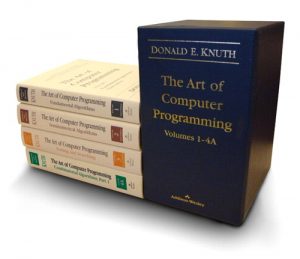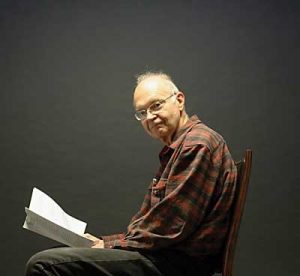 Since 1962, Donald Knuth, a professor at Stanford University, has been involved in the publication of his well-known monograph The Art of Computer Programming, an extensive treatise on algorithms and programming methods. The influence of this still unfinished work has been enormous, and Donald Knuth is considered the father of algorithm analysis. In 1974 he received the ACM Turing Award, which is informally considered the Nobel Prize in Computer Science. In our country, Donald Knuth was awarded the “BBVA Foundation Frontiers of Knowledge Award 2010 in Information and Communication Technologies” (a review of the news can be found in La Gaceta of the Real Sociedad Matemática Española).
Since 1962, Donald Knuth, a professor at Stanford University, has been involved in the publication of his well-known monograph The Art of Computer Programming, an extensive treatise on algorithms and programming methods. The influence of this still unfinished work has been enormous, and Donald Knuth is considered the father of algorithm analysis. In 1974 he received the ACM Turing Award, which is informally considered the Nobel Prize in Computer Science. In our country, Donald Knuth was awarded the “BBVA Foundation Frontiers of Knowledge Award 2010 in Information and Communication Technologies” (a review of the news can be found in La Gaceta of the Real Sociedad Matemática Española).The first edition of The Art of Computer Programming consisted of three volumes which were published in 1968, 1969 and 1973 respectively. This first edition had been produced using 19th century printing technologies, and the results had been very much to Knuth’s liking. By 1976, Knuth had prepared a second edition of volume 2. By then, the printing technologies had been replaced by more modern and cheaper ones, but which produced poorer quality results. Dissatisfied with the appearance of the proofs, he decided to take a sabbatical year in order to create a printing system to his liking with which he could publish his books.
Eventually, he spent almost ten years developing what he thought would take him a year. In that time he developed Metafont (a programming language for developing typefaces by defining the outlines of letters as piecewise polynomials) with which, in particular, he designed the font Computer Modern, and TeX, the popular open-source typesetting system so widely used in academic environments related to mathematics (LaTeX, which is more often referred to today, is built on top of TeX in a relatively simple way); In fact, many would be surprised to learn that it is also used in humanistic fields far away from mathematics, as its power and quality is unparalleled when great typographic complexity is required. In 1989, with the release of TeX version 3 and Metafont version 2, Knuth decided that he was not going to make any more changes to the system (except for bug fixes), in order to leave it stable for the future. Since then, he has devoted himself mainly to continuing to write The Art of Computer Programming and to his favourite hobby: playing the organ.
In an interview on 2 October 2001 in Tübingen (Germany), one of the questions Harald Koenig asked Knuth was the following:
«If you were young again, would you start writing TeX again or would you use Microsoft Word, or another word processor?»
The answer was blunt:
«I hope to die before I have to use Microsoft Word.»

If Donald Knuth had worked for the Spanish administration (or for a large publishing house based in Spain), this statement might have sounded like he was announcing his intentions to commit suicide.
In this connection, I cannot resist relating a personal anecdote. Around the same time as the interview, I tried to get the University of La Rioja to allow me to teach a TeX and LaTeX course organised as what was then called a “free-choice subject”. At my university, such subjects were officially included in the curricula so that students who wanted to could take them, but they did not count as teaching hours for us professors (in other words, they were taught for the sake of it). Even so, this required the authorisation of the Centre on which the Mathematics degree depended, which at the time was called the “Centro de Enseñanzas Científicas y Técnicas”, of infamous memory (my university, which was very modern, had no faculties). The response from the Director of the Centre (an engineer, by the way) was also blunt: “It’s not authorised. Why would anyone want to use TeX when Microsoft Word exists?”
One more thing! The Boletín published weekly by the Spanish Royal Mathematical Society always includes, as a colophon, a quote from a well-known person. In 2009, I suggested that they include in some issue the quote “I hope I die without having had to use Microsoft Word” by Knuth (I am not going to explain here what program is used to edit the Boletín, nor will I give my opinion on its aesthetics). The reply was that “I find the quote somewhat controversial, and not very mathematically related, but I will consult the staff”. I never heard anything more and, of course, it was not used.

“[…] ni echéis vuestras perlas delante de los cerdos” . Gracias por compartir LaTeXperiencia ;)
Como bien dice Juan Luis… ” …si hubiera trabajado para una gran editorial española…” Algunas pequeñas hemos trabajado muy seriamente con TeX y LaTeX, como Ediciones Electolibris… ¿será por eso que ha muerto?
En realidad, Microsoft Word es una aplicación estupenda para escribir cartas, informes internos o recetas de cocina, y JAMÁS NADIE debería emplearla para maquetar nada que se vaya a imprimir en forma de libro, folleto, revista, etc.
Para eso existen programas de maquetación con amplios controles tipográficos así como de color y de manejo de gráficos e imágenes, como Adobe InDesign o Quark Xpress.
Y, por supuesto, LaTeX.